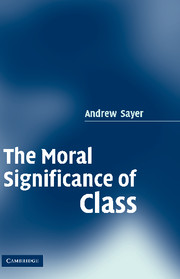Book contents
- Frontmatter
- Contents
- Preface and acknowledgements
- 1 Introduction
- 2 From the habitus to ethical dispositions
- 3 Recognition and distribution
- 4 Concepts of class: clearing the ground
- 5 Struggles of the social field
- 6 Moral and immoral sentiments and class
- 7 Responses to class I: egalitarianism, respect(ability), class pride and moral boundary drawing
- 8 Responses to class II: explanations, justifications and embarrassment
- 9 Conclusions and implications
- Bibliography
- Index
7 - Responses to class I: egalitarianism, respect(ability), class pride and moral boundary drawing
Published online by Cambridge University Press: 22 September 2009
- Frontmatter
- Contents
- Preface and acknowledgements
- 1 Introduction
- 2 From the habitus to ethical dispositions
- 3 Recognition and distribution
- 4 Concepts of class: clearing the ground
- 5 Struggles of the social field
- 6 Moral and immoral sentiments and class
- 7 Responses to class I: egalitarianism, respect(ability), class pride and moral boundary drawing
- 8 Responses to class II: explanations, justifications and embarrassment
- 9 Conclusions and implications
- Bibliography
- Index
Summary
Introduction
As we saw in the discussion of the micro-political struggles of the social field, the ways in which people act towards class others involve varying mixes of pursuit of advantage, deference, resistance, and pursuit of goods for their own sake. But they are also influenced by their moral sentiments and norms, which are only partially inflected according to class and other social divisions. They can operate (not necessarily intentionally) within the terms of class hierarchy or without regard for it. Yet, even actions which are not driven by struggle for advantage over others, indeed, even those that have egalitarian motives, are likely to be twisted by the field of class forces in ways which reproduce class hierarchy.
In this chapter I focus on four responses to class: egalitarian tendencies, the pursuit of respect and respectability, class pride, and moral boundary drawing. There are overlaps and tensions among all of these. Wanting to be equal can be coupled with wanting respect. Class pride claims and asserts what the pursuit of respectability merely seeks, and is usually coupled with moral boundary drawing. The subaltern, in particular, are likely to slide from one response to the next. In the context of structural class inequalities, all of them are likely to provoke condescension. They are most easily described in terms of intentions, but they may all also exist below the threshold of consciousness as dispositions, as part of the habitus.
- Type
- Chapter
- Information
- The Moral Significance of Class , pp. 169 - 186Publisher: Cambridge University PressPrint publication year: 2005



